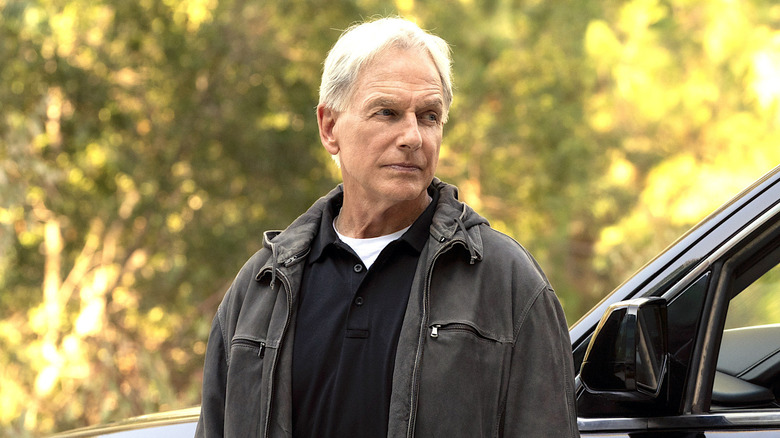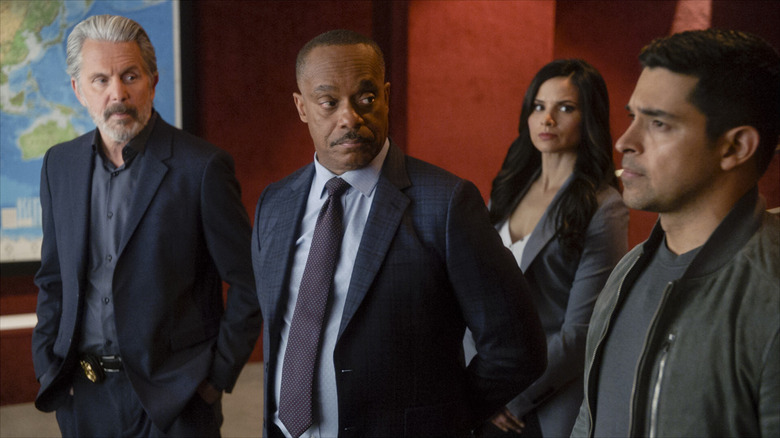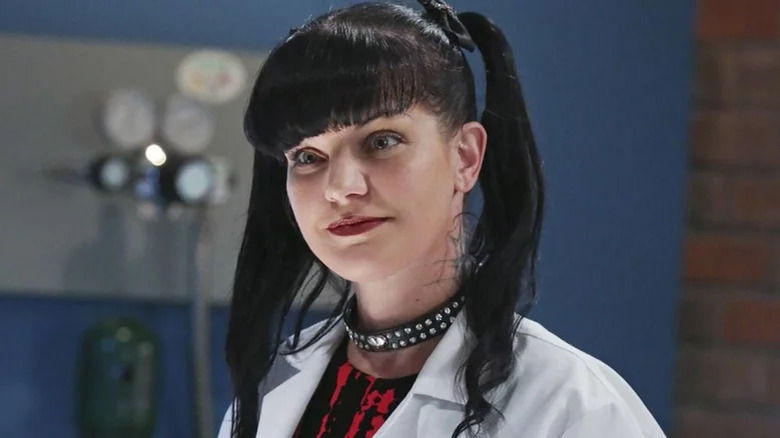Every NCIS Show Has The Exact Same Problem
When it comes to high-profile, old-school military police procedurals, viewers have plenty of options on TV. There's "NCIS," for one. There's also a series called "NCIS: Hawai'i." Reruns okay? Check out the recently ended "NCIS: Los Angeles," and "NCIS: New Orleans," which wrapped up in 2021. If you're into international stuff, you can even be a little adventurous and give "NCIS: Sydney" a try. How's that for variety?
Okay, so there's a reason behind all those "NCIS" shows, of course. The original has been a massive workhorse for CBS, to the point that it can still dominate the Nielsen charts in 2023. Still, while it does command a loyal and sizeable viewership, it's not the kind of show that sticks to mind. All of the "NCIS" shows tend to repeat the same story beats, and while this reliability has allowed "NCIS" to plant its feet firmly into the land of comfort food, it has also effectively removed the show from the cultural zeitgeist. In other words, "NCIS" has become the kind of franchise your elderly relatives watch and discuss on Facebook. That's not an exaggeration, by the way – in 2020, the median age of viewers watching "NCIS" was 65.3 years.
So, why hasn't "NCIS" been able to attract younger audiences? Sure, it has never pretended to be anything other than a popcorn case-of-the-week procedural, but there's a specific problem that every "NCIS" show has in common: these days, the franchise's shows barely count as procedurals, because they're actually far closer to soap operas.
NCIS' longevity, repetition, and quirky characters = daytime drama
There are some shows that never seem to end at all. These tend to be soap operas, as evidenced by the longevity of shows like "Days of Our Lives" and "General Hospital," but with 20 seasons and no end on the horizon, the original "NCIS" seems to have dipped its toes in this pool of eternity ... by, in fact, becoming a soap itself.
The show uses numerous soap opera tricks in its storytelling. Like any daytime drama, it has superficially high stakes and several changes in the main cast — and like any daytime drama, "NCIS" can nevertheless be relied on to maintain the overall status quo from week to week, from season to season. There are plenty of quirky characters whose interpersonal relationships tend to be more memorable than most of the plot arcs they amble their way through. There's even the occasional, extremely daytime drama-esque shocking character return, as fans of Ziva David (Cote de Pablo) can attest.
Speaking of Ziva, she's also central to another highly specific way "NCIS" uses soap storytelling. Her relationship with Tony DiNozzo (Michael Weatherly) is one of the show's two primary romances, along with Eleanor Bishop (Emily Wickersham) and Nick Torres (Wilmer Valderrama). However, in true daytime drama fashion, the parts of these relationships you actually see tend to focus on sexual tension and general smoldering instead of anything related to a normal relationship. "NCIS" will absolutely show someone's romantic interest getting hit by a car and falling into a coma, soap opera style. Meanwhile, Ziva and Tony having a child just sort of .... happens, fully offscreen.
On NCIS shows, the soap opera storytelling is less interesting than behind-the-scenes drama
The soap opera-style approach has an added drawback of the events of the show being far less interesting than the behind-the-scenes stuff. Sure, the trades watch every popular, long-running show like a hawk, but thanks to the franchise's comparatively predictable case-of-the-week pattern, "NCIS" is especially vulnerable to real-life production news being more fascinating than fictional plot arcs.
As such, whenever you see the franchise in the headlines, expect the news to center on real-life dramas. Remember all the noise when Abby Sciuto's actor Pauley Perrette left "NCIS," the theories, and the debates? Kind of takes away from Abby's on-screen exit. How about Mark Harmon leaving? News of the actor's new limited-episode deal removed any sense of finality from Leroy Jethro Gibbs' departure, and rumors of replacements took away the stakes of whether the show would be able to continue without its brightest star.
Even without real-life stuff hogging the headlines, the daytime drama vibe means that "NCIS" can lack a certain oomph when it comes to huge story beats like character deaths. Yes, plenty of "NCIS" characters have died, but more often than not, it's business as usual — comparatively minor characters, or ones whose story arcs are clearly telegraphed toward demise. There's nothing shocking, here, and the biggest "NCIS" competition is miles ahead on this front: With the possible exception of fellow dinosaur "Law & Order" and its "Special Victims Unit" spin-off, the closest point of comparison for "NCIS" is the "One Chicago" franchise — which, let's face it, operates on a completely different level when it comes to character deaths. The "One Chicago" shows are so famous for abruptly killing off significant characters that the shows' casts are worried during every season finale since they never know which one of them might suddenly be on their way out. Try as it might, "NCIS" can't touch that.
The NCIS spin-offs are just the original NCIS with a new coat of paint
So, does this soap opera problem extend to the "NCIS" spin-offs, as well? Trick question — they're all the same show. Painting your house with a different color doesn't change the building itself.
The "NCIS" spin-offs rely on the exact same building blocks as the parent show, which is entirely understandable — after all, why mess with a formula that works? Sure, there are superficial differences. "NCIS: Los Angeles" has hints of a goofy spy action show. The "NCIS: New Orleans" team basically consists of exaggerated cartoon characters, even compared to the original's eccentric flock. "NCIS: Hawai'i" is just "NCIS," but the cast is more inclusive and it's very sunny. As for "NCIS: Sydney," it's too early to judge — but being an international spin-off, chances are this apple won't fall too far from the tree, either.
Because of this, most points that apply to the parent show also fit the others. In fact, if anything, the small differences from the original actually hurt the spin-offs instead of helping them stand apart — at least, judging by the fact that both "Los Angeles" (14 seasons) and "New Orleans" (7 seasons) ended well before they could even dream of matching the original's longevity.
NCIS becoming a dinosaur isn't entirely the show's fault
Blame can't truly be placed on the "NCIS" franchise's shoulders. Much of its culturally obsolete status stems from the simple fact that "NCIS" is one of the last shows standing in its genre.
As "NCIS" co-creator Don McGill told The Hollywood Reporter, the "CSI" people were initially pretty disgruntled when his show launched. He's also admitted to drawing inspiration from the older crime scene investigation series when crafting "NCIS" — Abby, in particular, is basically "CSI" character Greg Sanders (Eric Szmanda) dialed up to 11. But even if some might've originally seen "NCIS" as a store brand "CSI," it clearly outlasted the competition.
"CSI" wrapped up a decade ago and is currently in its reunion tour phase with "CSI: Vegas." Unlike it and, say, "Criminal Minds," "NCIS" never required resurrection — and likely because of this, it's never really needed to course-correct. Cast changes aside, the "NCIS" of 2023 is still essentially the same show it was in 2003, with the only difference being that the TV landscape around it has rendered most long-running forensic procedurals extinct while superheroes, fantasy adaptations, and prestige dramas have risen to rule the roost.
Well ... culturally, anyway. The thing about soap operas is that people still love them. "NCIS" is no exception. The main show's ratings are great, and after the relative bellyflops of Seasons 18 and 19, fans have been enjoying the most recent season. Clearly, the formula still has legs. Perhaps we're looking at this all wrong, and the "NCIS" franchise is the past, present, and future of television. Maybe in a few decades' time, people only faintly remember things like "Breaking Bad" and the Marvel Cinematic Universe, but happily tune in to watch "NCIS: Sacramento" Season 37.




